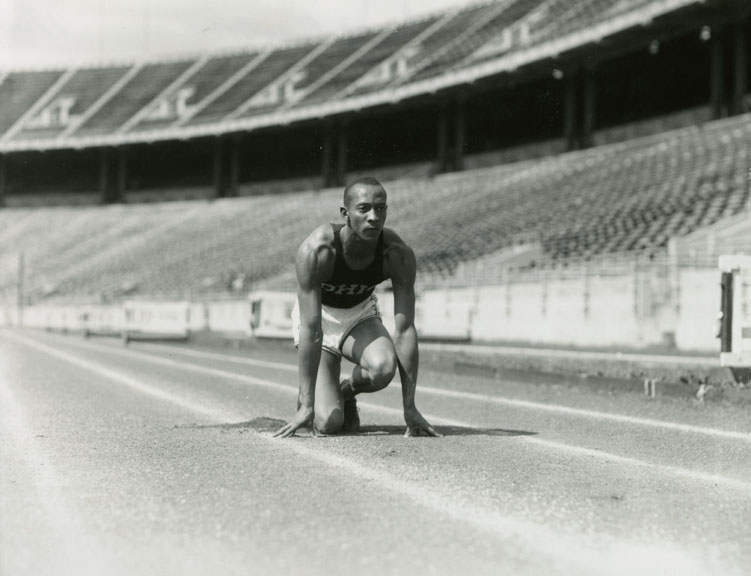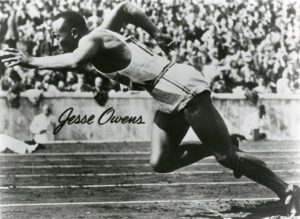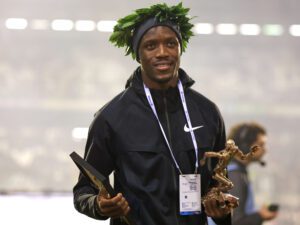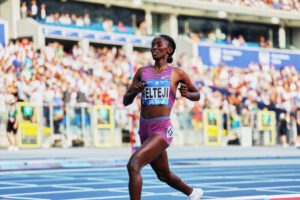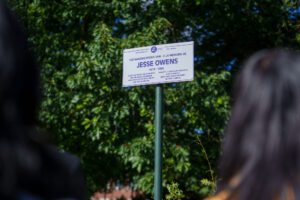This week, the Jesse Owens Rising Star Award will be inaugurated at the Wanda Diamond League Final in Brussels. The award, a collaboration between the Owens family, the Jesse Owens Foundation and the Wanda Diamond League, aims to celebrate young talent in athletics and honour the legacy of one of the sport’s most iconic figures.
So who was Jesse Owens and why is it important to keep the memory of his achievements alive today? In an exclusive interview with diamondleague.com, Owens’ granddaughter Gina Hemphill-Strachan gives an invaluable insight into the life and legacy of an athletics legend.
Gina Hemphill-Strachan, in 1936, your grandfather became a global sporting icon at the Olympic Games in Nazi Berlin. What was it like growing up as Jesse Owens’ granddaughter?
It’s funny: to us, he was just Granddad! Over the years I’ve had the opportunity to talk about him to a lot of people and sometimes I find it hard to differentiate between the man I knew as Granddad and the Olympian Jesse Owens. Everybody has a different relationship with their grandparents. My grandfather just happened to be a really great granddad who did a really, really great thing.
What was he like as a person?
He was someone who loved spending time with his family. He and my grandmother got a house in Union Pier, Michigan, where we could go as a family, go to the beach, swim in the pool and play in the yard. Later, I went to Arizona State University for college at a time when my grandparents lived in Phoenix, so I was able to spend some really valuable time with him there. He was always very encouraging and he was a great listener, though he was also old school and could sometimes be a little strict about certain things. But, you know, that was granddad!
He was also very gracious. When we went out for dinner, he would never finish the meal, because there was always somebody who would come up and say: “excuse me, are you Jesse Owens?” They would always ask for an autograph or a photo, and he never said no.
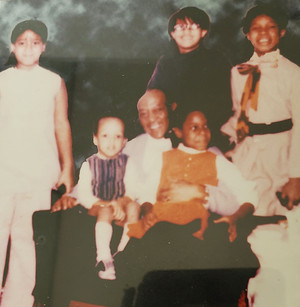
Jesse Owens with his grandchildren. Photo: Gina Hemphill-Strachan
To many people, he was the athlete who defied the Nazis’ racist ideology by winning four medals in Berlin. How old were you when you began to realise the significance of what he achieved at those Olympics?
Probably when I was 12 years old, and my cousin Donna and I travelled to Munich with him for the 1972 Olympic Games. It was like being with Michael Jackson, with hundreds of people swarming around the car and following him wherever he went. The Germans welcomed him home like one of their own. I think that in a way, that was also quite humbling for him. He saw it as a chance to give something back.
He was only 23 years old when he competed in Berlin. Not just a great athlete at the pinnacle of his career, he was also a young Black man thrown into a very difficult political situation. How much do you think that experience shaped him?
I think it shaped him in a way which might be unexpected to some people. Throughout his life, his mission and purpose was to advocate for young people to really persevere and have strength and belief in who they are, no matter where they come from or what their background. He came from very, very humble beginnings: nobody in his family was college-educated, nobody had travelled the world. So even the fact that he got to Ohio State University in the first place shaped him in a way which allowed him to be successful in Berlin: both as an athlete and as a person.
Despite becoming a global superstar, life wasn’t always easy for him after the Olympics. He returned to a US where racial segregation was still in place and athletes did not earn the kind of money they do today from endorsements and advertising. How did he experience those years after 1936?
He had a wife, he had a daughter. He had to find a way to make a living to be able to support them, so the responsibility of family took over what he had accomplished on the track. He worked at a gas station, and he ended up eventually owning a dry cleaners business as well. Later on, a lot of other opportunities became available to him in terms of representing the US Olympic Committee, speaking engagements and autograph signings. He also had sponsorships with companies like Lincoln Mercury and the Atlantic Richfield Company (ARCO), which established the ARCO Jesse Owens Games where track stars like Carl Lewis and Jackie Joyner-Kersee participated in when they were young kids.
I honestly don’t know how it affected him that some doors were closed to him and that he never had some of the opportunities he should have had. Quite frankly, I think it just made him stronger.
Jesse Owens pictured in his Olympic kit in 1936. Photo: Ohio State University Archives
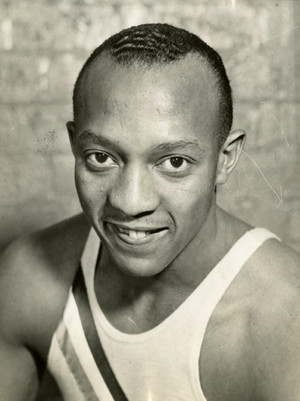
How do you think he saw his own legacy? Did he see himself as a political figure as well as an athlete?
I think he understood that his legacy was not just about his gold medals, but about inspiring future athletes and future generations. He was somebody who had a great global impact which extended beyond sports. The power of his athletic achievement is something which inspires people globally to challenge societal norms and inspire social change.
I wouldn’t say he felt he was either political or not political. I don’t think it was in his nature to be outspoken in the civil rights movement in the same way that athletes like Muhammad Ali, Jackie Robinson or Jim Brown were. But he was absolutely supportive of their mission, and he was certainly a symbol of pride and hope, both for African-Americans and for others as well. His victories provided a counter-narrative to discriminatory beliefs in a slightly different way.
How important is it for you and your family to uphold that legacy?
I often say it’s unfortunate that his legacy and accomplishments only really come alive every four years at the Olympics, and I think it’s really important that we continue to teach young people about who he was. But I think it’s getting better. When the movie “Race” came out a few years ago, a lot of people had a chance to see it and learn about his story. There were several screenings where either myself or someone else in our family would be invited to do Q&As afterwards. That gave us a nice opportunity to share our experiences of him as well.
In 1984, just a few years after he passed away, you also carried the Olympic torch into the stadium at the Opening Ceremony of the LA Olympics in memory of your grandfather.
That was tremendous. I wasn’t allowed to tell anyone beforehand, even though my family were going to be there. As I hit that track, the roar of the crowd and the music was so overwhelming – in a good way. I was so proud because I could hear over the loudspeaker when they said: “Bringing in the Olympic flame is the granddaughter of Olympic great, Jesse Owens!”
When they said his name, the crowd just went crazy. I put my arm up at that moment, and I felt like he was smiling down on me. I knew my grandmother was in the stands, and I knew she would be an emotional wreck, not having known I was going to do it. I felt so proud to have been asked. There were so many people who would have deserved to play that role, but the fact that people felt his story was important enough to have me represent him…I’m so grateful for that.
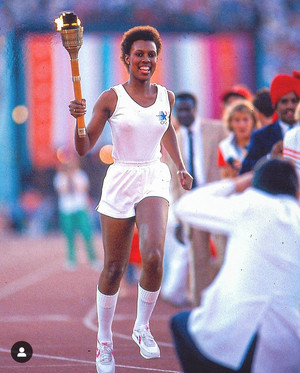
Gina Hemphill-Strachan carries the Olympic torch into the stadium in 1984. Photo: Gina Hemphill-Strachan
What does it mean to you that your grandfather will now be honoured every year at the Wanda Diamond League Final with the Jesse Owens Rising Star Award?
It’s a really great thing. We’re so honoured as a family that they would name the Rising Star Award after Grandad. He became a rising star when he went to Ohio State University, and that was the result of hard work, it was the result of sacrifice, it was the result of perseverance. It was also the result of a purpose that’s bigger than the sport. Nowadays, the sport is still producing rising stars with people like Noah Lyles, Gabby Thomas, Sydney McLaughlin-Levrone, Quincy Hall and Tara Davis-Woodhall, who I love. So we are really very honoured to have the award in his name.
Are there still things that young athletes can learn from your grandfather’s story, even almost a century on from the Olympics in Berlin?
I do think it’s so important what young athletes do, and not just in track and field but in every sport. With social media, they have such a broader platform now to be able to make an impact in their communities. That’s an opportunity which my grandfather and his teammates didn’t necessarily have. So I think in some ways, what my grandfather achieved is now almost coming full circle.
About the Jesse Owens Foundation
The Jesse Owens Foundation seeks to perpetuate the beliefs of Jesse Owens through its support of the Ruth and Jesse Owens Scholars Program at the Ohio State University. Further, the Foundation provides information, materials, and direction for research on his life and legend. Services are provided without regard to race, creed, color, national origin, or sex.
About the Wanda Diamond League
The Wanda Diamond League is the elite one-day meeting series in global athletics. It comprises 15 of the most prestigious events in global track and field. Athletes compete for points at the 14 series meetings in a bid to qualify for the two-day Wanda Diamond League Final in Brussels on 13th-14th September 2024.
